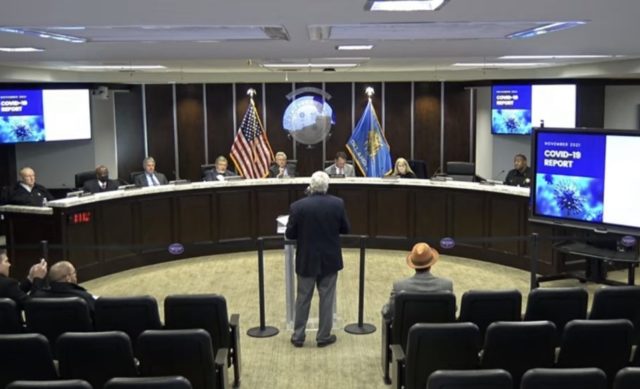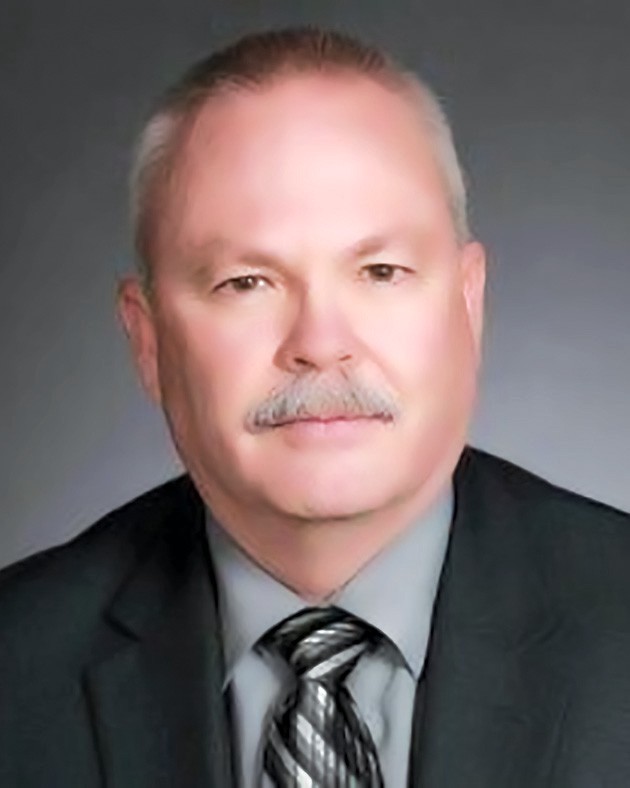

Amid controversy surrounding a hot-mic moment and a spate of deaths at the Oklahoma County Jail, CEO Greg Williams still enjoys support among jail trust members and at least one county commissioner.
An accidental voicemail recording obtained by NonDoc and published Feb. 8 featured Williams and the jail’s director of communications, Mark Opgrande, calling the COVID-19 pandemic “the greatest thing that has ever happened to us” and “a built-in excuse” to keep media and other visitors out of the troubled jail.
“COVID is our friend,” they both said at one point in the recording.
The comments were in reference to more than $10 million in CARES Act funds the jail received last year and another $150 million in American Rescue Act Plan funds the county may soon use to construct a new jail.
Local advocates for criminal justice reform were swift to call for the dismissal of both men. Among those who spoke out at a Board of County Commissioners meeting Feb. 9 was Sara Bana, a longtime activist who was recently elected to the Midwest City Council.
“Greg Williams needs to immediately resign,” Bana said. “It bewilders me that he has not yet himself stepped up with dignity and humility and submitted his own resignation. Both men, Opgrande and Greg, need to go.”
Restauranteur Sean Cummings, another frequent critic of the jail and its leadership, blamed county commissioners for not taking action.
“There’s always a hot mic. That’s when we find out what people are truly like,” he said. “(They said) ‘COVID is our friend,’ back and forth. What I want to know out of you three (county commissioners) is how are both of them still employed?”
District 1 County Commissioner Carrie Blumert said she was “appalled” but stopped short of calling for Williams’ dismissal by the jail trust, or his resignation.
“This is yet another incident where the jail’s leadership has failed to understand their responsibility to operate our county’s detention center,” Blumert said in a statement she released via Twitter. “The attitudes expressed raise concerns about the jail’s COVID-mitigation policies, transparency, and the overall safety and well-being of detainees and staff.”
Williams issued a statement apologizing for the voicemail.
“COVID-19 has presented safety concerns throughout the pandemic, requiring us to limit access to visitors,” Williams said. “I regret the insensitive nature of our comments recorded in an unguarded moment and recognize the hurt and pain this pandemic has caused. I apologize for any offense or discomfort our words caused.”
Some trust members support Williams
The nine-member jail trust hired Williams in 2019 and would also be responsible for disciplining him. In a statement at the time NonDoc’s story about the recording was published, jail trust Chairman Jim Couch defended Williams.
“We are disappointed in these comments, but we know how hard this team has worked to improve conditions at the jail for detainees, staff and vendors,” Couch said. “Funding in response to COVID has been beneficial in addressing new challenges from the pandemic and improving long-standing infrastructure issues. The jail trust prioritizes the safety and wellbeing of those in the jail’s custody and we are pleased that the spread of COVID has been limited. We remain committed to transparency and openness.”
A number of other jail trust members, including one county commissioner, have also stood behind Williams.

Trust member Sue Ann Arnall told NonDoc she was “disappointed” with Williams and Opgrande but did not call for their removal.
“I am extremely disappointed in Williams and Opgrande, and the content of their conversation,” Arnall said. “However, I do not believe that they truly believe that COVID is their friend or that the main impact from COVID has been positive. As we all are too well aware, this pandemic has decimated millions of lives.”
Jail trust member and District 3 County Commissioner Kevin Calvey defended Williams, largely on the basis of Williams’ own personal experience with the pandemic.
“If you look at it in context, Greg Williams lost his own mother to COVID,” Calvey said. “And, in fact, because of COVID protocols he wasn’t able to be at her bedside. He had to tell her he loved her by holding up a sign in the window. When you put that into context, his comments were much more innocuous than they would seem taken out of context.”
Calvey also praised Williams’ management of the jail, which was previously operated by the Oklahoma County Sheriff’s Office.
“Greg Williams has done a great job,” said Calvey, who is running to be Oklahoma County district attorney. “The jail is much better run than it was before Greg took over as the CEO. He’s managed to fix a whole lot of things there. Helped changed the culture, or started to. The level of violence is way down, so I think we’re making progress.”
Jail trust member Ben Brown said the recording has been overblown.
“It was it was a poor choice of words, yeah,” Brown told KFOR. “But the truth is that that money was used to make things better at the jail, including pay and health care.
“I kid and say things that, you know, that really aren’t true, but they’re done in a kiddy manner between two friends. And those friends kind of understand what it means, and they get it. So I, you know, I hate that this is being blown up.”
Jail trust member Chad Alexander deferred to Couch’s statement when asked for a reaction to the recording.
Criminal Justice Advisory Council executive director Tim Tardibono echoed support for Williams and the trust. CJAC is the body that recommended creation of the jail trust to county commissioners.
“It was an unfortunate incident and a really poor choice of language, but those of us who know and work with Greg know that is not his character,” Tardibono said. “We know they are making progress and changes for the better and, finally, the trust was created with nine trustees, and we trust the trustees to make good decisions, and we think they have that capacity, and we think they’ll make good decisions on how to handle their employees.”
Deaths still frequent inside jail
While some aspects of the jail, such as the plumbing and HVAC systems, have improved thanks to the use of CARES funds, the Oklahoma County Jail continues to be a deadly place for inmates. The jail saw 40 deaths in a three year period beginning in 2016, according to Oklahoma Watch. More than a dozen people died in the facility in 2021.
This year is off to a grim start with three deaths so far, the most recent of which took place Feb. 13, when inmate Kyle Shaw was found unresponsive in his cell. Shaw had been held since May 13, according to information released by the jail.
A grand jury was empaneled in September partially to examine jail operations and the jail trust at the request of Oklahoma County District Attorney David Prater, who has been critical of the trust and the facility’s operation. Prater later recused himself from the grand jury investigation, and Attorney General John O’Connor assigned Cherokee County District Attorney Jack Thorp to oversee it.
The implications of the criminal inquiry into issues at the Oklahoma County Jail could be a factor in trust members’ decisions to support Williams and Opgrande. Were the two terminated by the trust, they might have more motivation to speak openly and without regard for their jobs if questioned or subpoenaed to testify about issues at the troubled facility.
French journalist not surprised by lack of access
The conversation between Williams and Opgrande captured in the December voicemail recording was prompted by an interview request from French journalist Brice Lambert, who was seeking to interview female detainees for a film documentary project on the incarceration of women in the United States.
In the recording, Opgrande and Williams discuss denying Lambert’s request by citing COVID concerns and the lack of material he might find inside for his project.
Lambert, who is based in Paris, told NonDoc by phone that he was surprised to hear the voicemail but not surprised his request was denied.
“I always knew COVID was a good way to keep people at bay,” Lambert said. “There are obvious risks, and we understood that. We always tell them we are open to their requirements, whatever they are, to visit, but I was not surprised it is used as an excuse.”
Lambert said he was often denied access to detention centers while making the film. He had also attempted to get access from the Oklahoma Department of Corrections and the Tulsa County Jail.
“I had help from a lot of people trying to make it work in Oklahoma,” he said. “Unfortunately, the Department of Corrections denied our requests. I tried many ways. I talked to the Sheriff’s Office. I tried with the jail trust. Unfortunately, I was not successful. Our request to Oklahoma County was probably the closest we got to ‘yes.'”
Lambert’s documentary focuses on Oklahoma because the state incarcerates women at one of the highest rates in the world.
“The idea started when I discovered that women were the fastest growing prison population in the United States, which isn’t something that I knew, but as I started reading about it I became more interested,” he said. “I started looking at the rise in figures and, as you know, Oklahoma has been leading that trend for almost 30 years.”
Despite striking out at jails and prisons, Lambert was able to complete part of his project by speaking to others involved in criminal justice issues in Oklahoma, including public defenders, at least one judge and several women who previously served time in prison. A short version of the documentary has aired on French TV.
Lambert said criminal justice in France is vastly different from the United States.
“We incarcerate at a very low rate compared to the United States, and a very low rate compared to Oklahoma,” Lambert said. “We don’t rely on incarceration to solve problems the same way the United States does. We don’t have the length of sentences for what we would consider minor, nonviolent crimes. It was very shocking to us for such small crimes to have such long sentences.”




















